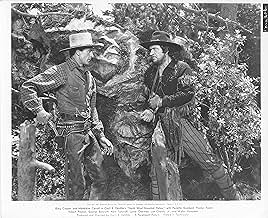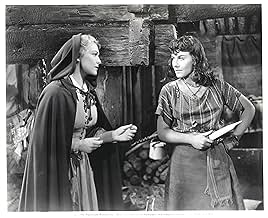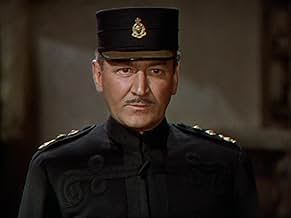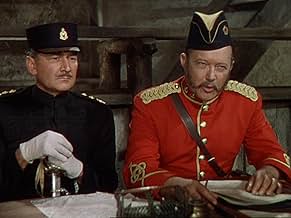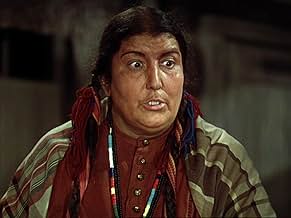IMDb रेटिंग
6.3/10
2 हज़ार
आपकी रेटिंग
1885 में, टेक्सास रेंजर कनाडा की यात्रा करते हैं, जो ऐसे फसानेवाले को गिरफ्तार करना चाहते हैं जो हत्या के लिए वछित है और जिसने कनाडा सरकार के खिलाफ विद्रोह करने के लिए देशवासियों को भड़काया.1885 में, टेक्सास रेंजर कनाडा की यात्रा करते हैं, जो ऐसे फसानेवाले को गिरफ्तार करना चाहते हैं जो हत्या के लिए वछित है और जिसने कनाडा सरकार के खिलाफ विद्रोह करने के लिए देशवासियों को भड़काया.1885 में, टेक्सास रेंजर कनाडा की यात्रा करते हैं, जो ऐसे फसानेवाले को गिरफ्तार करना चाहते हैं जो हत्या के लिए वछित है और जिसने कनाडा सरकार के खिलाफ विद्रोह करने के लिए देशवासियों को भड़काया.
- 1 ऑस्कर जीते
- 4 जीत और कुल 4 नामांकन
फ़ीचर्ड समीक्षाएं
"Oh Dusty, you're an angel in leather!" "I love you so terrible bad I feel good!" "You're the sweetest poison that ever got into a man's blood!"
Campy and implausible enough to be written up in "The Fifty Worst Films of All Time", yet too slow to be as amusing as "The Conqueror". Set in 19th century Quebec, the characters mill around a wilderness fort, chase each other and a gattling gun, lust after each other, and spout ridiculous dialogue. It takes forever and drags a lot, but it looks nice for something shot on a soundstage, and there are some decent actors like Gary Cooper and Madeline Carroll in it, even if they look kind of embarrassed.
What keeps this from being other boring costume melodramas like "Unconquered" is the usually wooden Paulette Goddard as a half-breed temptress. (You just know you're in for something bad when you see those words) We're talking high camp, over-the-top ludicrous, with her silly accent and sillier makeup, and supreme overconfidence in her ability to handle a role like this. It's worth tuning it to see her sashay around in her leather-and-feather costumes, chewing the scenery while doing stuff like public spankings and tormenting a bound Robert Preston.
Campy and implausible enough to be written up in "The Fifty Worst Films of All Time", yet too slow to be as amusing as "The Conqueror". Set in 19th century Quebec, the characters mill around a wilderness fort, chase each other and a gattling gun, lust after each other, and spout ridiculous dialogue. It takes forever and drags a lot, but it looks nice for something shot on a soundstage, and there are some decent actors like Gary Cooper and Madeline Carroll in it, even if they look kind of embarrassed.
What keeps this from being other boring costume melodramas like "Unconquered" is the usually wooden Paulette Goddard as a half-breed temptress. (You just know you're in for something bad when you see those words) We're talking high camp, over-the-top ludicrous, with her silly accent and sillier makeup, and supreme overconfidence in her ability to handle a role like this. It's worth tuning it to see her sashay around in her leather-and-feather costumes, chewing the scenery while doing stuff like public spankings and tormenting a bound Robert Preston.
Cecil B. DeMille's fame as a leading movie director is still secure because of his innovative nature. He certainly developed spectacle movies, and even today he is remembered as the pioneer. But that does not blind us to his flaws. His characters are not three dimensional usually but black or white in personality. His dialog is for the birds. He does fall into stereotypes too often. It is understandable that the Medveds included "Northwest Mounted Police" among the 50 worst movies ever made.
Yet one can't easily dismiss it. It was DeMille's first color movie. It was the second of four films with Gary Cooper, one of four made Goddard and one of three made with Robert Preston. Preston made good action films in this period but was always in support. In the early 1950s he returned to the stage and the fame that eluded him in Hollywood. Came "The Music Man", "The Lion In Winter", and "Mack and Mabel" and the recognition of Preston the adept entertainer. Came the call back to Hollywood for his filmed performances as Harold Hill and Toddy (in "Victor/Victoria"). Preston was that rarity: an actor who proved his star qualities in middle-age. DeMille would never have been his kind of director: he had no light touch for comedy, and he did not do musicals. Still, for some good straight performances as doomed weaklings, Preston did well in this film,"Union Pacific", and "Reap the Wild Wind".
The film's historic content is interesting. DeMille's earlier historic films ("Cleopatra", "Sign of the Cross", "The Crusades") dealt with old world history. But after the last DeMille concentrated on American history with "The Plainsman", "The Buccaneer", "Union Pacific", "Reap The Wild Wind", and "The Unconquered". Even the modern "The Story of Dr. Wassell" was based on a true tale connected with the current war in the Pacific.
Because of his American History period "Northwest Mounted Police" is an odd film. Cooper's character is the only link in it to American history in the 1880s, as a Texas Ranger after George Bancroft (Le Corbeau) for murder. The film is set firmly in Canada which was the scene of two revolts of the Metis people under Louis Riel in 1870 and 1885. As such this becomes somewhat unique among the historic films of Hollywood.
Canada does poorly regarding it's history in Hollywood. This movie actually covers one of the most troubling moments of modern Canadian history: the fate of Louis Riel. We don't know about it down here. Riel was a lawyer and teacher with some mental problems. Riel helped found the provinces of Manitoba and Saskatchewan, thus making him one of Canadian history's founding fathers. But he was also aware that French Canadians and his Metis people got a suspiciously short deal from the British Canadians in Canada. Canada was firmly controlled by the Tory party led by Sir John MacDonald. MacDonald was corrupt but made one of the great comebacks in political history in 1879. Riel had led a revolt in 1870 which was crushed. He fled to the U.S., and spent some time in asylums here. He was released, taught school in Montana, and then returned to Canada (illegally) in 1884. He organized a second Metis revolt, which nearly succeeded in winning an independent state. A British army crushed it in 1885, captured Riel, and he was tried for treason.
Lives had been lost, and property destroyed. MacDonald's son had been sent to Manitoba to run the province, and he had been humiliated by the revolt. Riel, however, had some legitimate gripes about the treatment of French Canadians, and the Metis. The treason trial came, and he was found guilty. MacDonald apparently never had a moment's hesitation about what to do. He refused to stop Riel's execution. The Tory Party in Canada has never recovered from this mistake. The backbone of Liberal Party strength (to the current day) is French Canadien Quebec - they have never forgiven the Tories for not acting humanely to Louis (and putting him in a Canadian asylum for life).
DeMille is not totally anti-Riel. Riel is not unlike the American John Brown (inthe contemporary film "Santa Fe Trail"), who is murderous and possibly insane but fighting for certain principles that actually get the audience's sympathy. In this film, Riel is committed to a Metis revolt and state and he will stop at nothing to prevent it's success. But he also is shown as a kindly man to young children (he was a school teacher, remember).He is trying to save a way of life that a juggernaut threatens. And he is resigned to his fate at the end, realizing that in dying he may still win (which happened). We need a subsidiary villain like Van Heflin in "Sante Fe Trail" who is villainous for money. Here it is Bancroft, a murderer and criminal who is Riel's assistant. His villainy is passed down through his genes to his daughter (Goddard) who tempts and betrays Preston. One wonders, had Riel formed a successful government and state, how long before Le Corbeau would have arranged an "accident" or "assassination" (by a "Tory" agent, of course) of Riel, in order to cement his control over the Metis nation. So when he gets his just deserts at the end, unlike poor Louis, we are cheered by it. One has to congratulate DeMille in trying to be fair to Louis, when he could have just made his a super villain.
Yet one can't easily dismiss it. It was DeMille's first color movie. It was the second of four films with Gary Cooper, one of four made Goddard and one of three made with Robert Preston. Preston made good action films in this period but was always in support. In the early 1950s he returned to the stage and the fame that eluded him in Hollywood. Came "The Music Man", "The Lion In Winter", and "Mack and Mabel" and the recognition of Preston the adept entertainer. Came the call back to Hollywood for his filmed performances as Harold Hill and Toddy (in "Victor/Victoria"). Preston was that rarity: an actor who proved his star qualities in middle-age. DeMille would never have been his kind of director: he had no light touch for comedy, and he did not do musicals. Still, for some good straight performances as doomed weaklings, Preston did well in this film,"Union Pacific", and "Reap the Wild Wind".
The film's historic content is interesting. DeMille's earlier historic films ("Cleopatra", "Sign of the Cross", "The Crusades") dealt with old world history. But after the last DeMille concentrated on American history with "The Plainsman", "The Buccaneer", "Union Pacific", "Reap The Wild Wind", and "The Unconquered". Even the modern "The Story of Dr. Wassell" was based on a true tale connected with the current war in the Pacific.
Because of his American History period "Northwest Mounted Police" is an odd film. Cooper's character is the only link in it to American history in the 1880s, as a Texas Ranger after George Bancroft (Le Corbeau) for murder. The film is set firmly in Canada which was the scene of two revolts of the Metis people under Louis Riel in 1870 and 1885. As such this becomes somewhat unique among the historic films of Hollywood.
Canada does poorly regarding it's history in Hollywood. This movie actually covers one of the most troubling moments of modern Canadian history: the fate of Louis Riel. We don't know about it down here. Riel was a lawyer and teacher with some mental problems. Riel helped found the provinces of Manitoba and Saskatchewan, thus making him one of Canadian history's founding fathers. But he was also aware that French Canadians and his Metis people got a suspiciously short deal from the British Canadians in Canada. Canada was firmly controlled by the Tory party led by Sir John MacDonald. MacDonald was corrupt but made one of the great comebacks in political history in 1879. Riel had led a revolt in 1870 which was crushed. He fled to the U.S., and spent some time in asylums here. He was released, taught school in Montana, and then returned to Canada (illegally) in 1884. He organized a second Metis revolt, which nearly succeeded in winning an independent state. A British army crushed it in 1885, captured Riel, and he was tried for treason.
Lives had been lost, and property destroyed. MacDonald's son had been sent to Manitoba to run the province, and he had been humiliated by the revolt. Riel, however, had some legitimate gripes about the treatment of French Canadians, and the Metis. The treason trial came, and he was found guilty. MacDonald apparently never had a moment's hesitation about what to do. He refused to stop Riel's execution. The Tory Party in Canada has never recovered from this mistake. The backbone of Liberal Party strength (to the current day) is French Canadien Quebec - they have never forgiven the Tories for not acting humanely to Louis (and putting him in a Canadian asylum for life).
DeMille is not totally anti-Riel. Riel is not unlike the American John Brown (inthe contemporary film "Santa Fe Trail"), who is murderous and possibly insane but fighting for certain principles that actually get the audience's sympathy. In this film, Riel is committed to a Metis revolt and state and he will stop at nothing to prevent it's success. But he also is shown as a kindly man to young children (he was a school teacher, remember).He is trying to save a way of life that a juggernaut threatens. And he is resigned to his fate at the end, realizing that in dying he may still win (which happened). We need a subsidiary villain like Van Heflin in "Sante Fe Trail" who is villainous for money. Here it is Bancroft, a murderer and criminal who is Riel's assistant. His villainy is passed down through his genes to his daughter (Goddard) who tempts and betrays Preston. One wonders, had Riel formed a successful government and state, how long before Le Corbeau would have arranged an "accident" or "assassination" (by a "Tory" agent, of course) of Riel, in order to cement his control over the Metis nation. So when he gets his just deserts at the end, unlike poor Louis, we are cheered by it. One has to congratulate DeMille in trying to be fair to Louis, when he could have just made his a super villain.
The master of spectacle doesn't let us down in that regard with his first movie shot in Technicolor.The action sequences are as exciting as in other De Mille spectacles but the hammy acting,the ridiculous dialog and slow pacing makes this a below par movie for De Mille. Gary Cooper and Madeleine Carroll look embarrassed throughout speaking those silly lines.Preston Foster as the third party of the love triangle has one of his more substantial parts in his career.But it is fun to watch Paulette Goddard's hilarious overacting.As her villainous father George Bancroft isn't far behind in that department.The best acting are provided by the two veterans Akim Tamiroff and Lynne Overman who provide some comic relief.The movie is beautiful to look at in bright colors and passes the afternoon quite painlessly.
I happened to see this last Sunday afternoon on the T.V. At first the film looked dated but the costumes and general appearance of the people in it convincingly portrayed people of that era (something that doesn't happen as often as it should in "Westerns"); it soon became apparent that things were being done rather well and by the time the credits came along and I saw the name of Cecil B DeMille I knew why.
This is an entertaining, undemanding film. There is a great deal to enjoy if one puts aside ones modern sophistication. I particularly enjoyed the way the mounties were portrayed as a dedicated and disciplined police force, loyal to the Crown and doing a worthwhile job in very difficult circumstances. Gary Cooper's Texas Ranger helped to highlight the qualities of the Mounties and provided interest and excitement.
Crowd scenes and action scenes are well done. The stunt towards the end involving Gary Cooper's character tumbling from his falling horse is breathtaking and the quick cut to a back projection immediately after is very effective; it is a scene that can match anything in today's films. Characters have interesting scenes and the humour is dealt with a sure touch. The film has all the signs of a good director.
I didn't expect to enjoy this film, but I did and I look forward to finding more from the same period.
This is an entertaining, undemanding film. There is a great deal to enjoy if one puts aside ones modern sophistication. I particularly enjoyed the way the mounties were portrayed as a dedicated and disciplined police force, loyal to the Crown and doing a worthwhile job in very difficult circumstances. Gary Cooper's Texas Ranger helped to highlight the qualities of the Mounties and provided interest and excitement.
Crowd scenes and action scenes are well done. The stunt towards the end involving Gary Cooper's character tumbling from his falling horse is breathtaking and the quick cut to a back projection immediately after is very effective; it is a scene that can match anything in today's films. Characters have interesting scenes and the humour is dealt with a sure touch. The film has all the signs of a good director.
I didn't expect to enjoy this film, but I did and I look forward to finding more from the same period.
1940's "North West Mounted Police" may have been Paramount's biggest box office success that year, but considering it as the first color film for director Cecil B. De Mille it must rank as one of his few failures. The Duck Lake massacre of 1885 led by Louis Riel (Francis McDonald) provides a solid backdrop for an abundance of poorly sketched characters unable to overcome the sluggish pace. The chief villain is Jacques Corbeau (George Bancroft), whose wildcat half breed daughter (Paulette Goddard) is in love with Mountie Ronnie Logan (Robert Preston). Gary Cooper toplines as the Texas Ranger sent north to bring Corbeau to justice, sparring with dedicated Sergeant Jim Brett (Preston Foster) over the lovely April Logan (Madeleine Carroll), sister of Ronnie. This makes it sound like a real snoozefest, and while it's not quite that bad it certainly isn't very captivating. Supporting players like George E. Stone are on and off in a flash, while poor Lon Chaney (previously seen in a silent role in De Mille's "Union Pacific") doesn't fare much better as Shorty, one of the trappers involved with Riel, who at least has a chance to exult in becoming a father. We last see him with his pretty young wife, properly scolding him before he meekly replies, "yes mama."
क्या आपको पता है
- ट्रिवियाCecil B. DeMille initially thought Paulette Goddard was all wrong for the role of the half-breed Indian girl. Marlene Dietrich, Vivien Leigh, Katherine DeMille, Simone Simon, Anna Sten, Olympe Bradna, and Steffi Duna were considered for the part, but when Goddard showed up in his office in costume and make-up speaking pidgin English, he cast her.
- गूफ़Just before heading out to find Corbeau, Rivers helps April up onto her wagon. A few minutes later we see her climb up again, on her own.
- भाव
Dusty Rivers: Down where I come from we don't jump to conclusions. It's liable to be a feller's last jump.
- इसके अलावा अन्य वर्जनThe UK DVD is cut by 6 secs with edits to cruel horsefalls.
- कनेक्शनFeatured in Cecil B. DeMille: American Epic (2004)
टॉप पसंद
रेटिंग देने के लिए साइन-इन करें और वैयक्तिकृत सुझावों के लिए वॉचलिस्ट करें
- How long is North West Mounted Police?Alexa द्वारा संचालित
विवरण
- रिलीज़ की तारीख़
- कंट्री ऑफ़ ओरिजिन
- भाषा
- इस रूप में भी जाना जाता है
- The Royal Canadian Mounted
- फ़िल्माने की जगहें
- उत्पादन कंपनी
- IMDbPro पर और कंपनी क्रेडिट देखें
- चलने की अवधि2 घंटे 6 मिनट
- पक्ष अनुपात
- 1.37 : 1
इस पेज में योगदान दें
किसी बदलाव का सुझाव दें या अनुपलब्ध कॉन्टेंट जोड़ें

टॉप गैप
By what name was North West Mounted Police (1940) officially released in India in English?
जवाब
